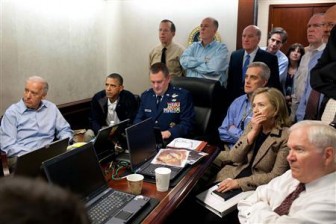WASHINGTON, (Reuters) – U.S. special forces set out to kill Osama bin Laden and dump his body in the sea to make it harder for the al Qaeda founder to become a martyr, U.S. national security officials told Reuters on Monday.
“This was a kill operation,” one of the officials said.
“If he had waved a white flag of surrender, he would have been taken alive,” the official added. But the operating assumption among the U.S. raiders was that bin Laden would put up a fight — which he did.
Bin Laden “participated” in a firefight between the U.S. commandos and residents of the fortified compound near the Pakistani capital Islamabad where he had been hiding, the official said.
The official would not explicitly say whether bin Laden fired on the Americans, but confirmed that during the course of the 40-minute operation the U.S. team shot bin Laden in the head.
Three other men and a woman lay dead after the raid, but no Americans were killed. John Brennan, President Barack Obama’s top counterterrorism adviser, said U.S. officials believed the woman was one of bin Laden’s wives and that he had used her as a human shield.

Brennan said the commandos were prepared to capture bin Laden alive, but they knew that was a remote possibility.
“If we had the opportunity to take bin Laden alive, if he didn’t present any threat, the individuals involved were able and prepared to do that,” Brennan told reporters.
“The concern was that bin Laden would oppose any type of capture operation. Indeed, he did. It was a firefight. He, therefore, was killed in that firefight, and that’s when the remains were removed.”
The operation was carried out by a team of about 15 special forces operatives — most, if not all, U.S. Navy SEALs, according to U.S. officials familiar with the details. They indicated the team was based in Afghanistan.
One official said it included forensic specialists whose job was to collect evidence proving that bin Laden was caught in the raid and intelligence that might be useful in tracking down other al Qaeda leaders or foiling ongoing plots.
Within hours of bin Laden’s death, which Obama announced in a dramatic, late-night White House speech, the commandos had buried bin Laden’s body at sea, two U.S. officials said.
It was done so that bin Laden’s body would not become a symbol of veneration or inspiration for would-be militants, U.S. officials said.
“You wouldn’t want to leave him so that his body could become a shrine,” one of the officials said.
CIA WAS CONFIDENT
U.S. officials said the key information that eventually led to bin Laden’s trail came from questioning of militants detained by U.S. forces following the Sept 11, 2001, attacks on New York and Washington.
Captured militants, including some held at the U.S. military prison at Guantanamo Bay in Cuba, told intelligence officials of a particular al Qaeda “courier” whom they had heard was close to bin Laden.
They also mentioned two captured al Qaeda operations chiefs, including Khalid Sheikh Mohammed, widely believed to have masterminded the attacks.
Initially U.S. intelligence did not know either the name or whereabouts of the courier. But officials said that about four years ago, U.S. agencies learned the individual’s name.
Two years ago, U.S. intelligence received credible information indicating that the courier and his brother, another suspected militant operative, were operating somewhere near Islamabad.
Then, in August 2010, the U.S. pinpointed the compound in Abbottabad where intelligence indicated the two brothers, their families, and a third large family were living.
It was located in a ritzy neighborhood at the end of a dirt road, not far from one of Pakistan’s principal military academies. Residents of the area included retired Pakistani military officers.
Working with the National Geospatial-Intelligence Agency (NGA), which analyzes pictures from spy satellites and aircraft, and the National Security Agency, which conducts electronic eavesdropping, the CIA concluded that the compound was built with unusual security features — including high-walls topped with barbed-wire — and that its inhabitants appeared to take unusual security precautions.
By earlier this year, the CIA believed that it had “high confidence” that a “high-value” al Qaeda target was at the Abbottabad compound, and a strong probability that this target was bin Laden.
But one official said the agency was never “100 percent certain” that bin Laden was the one who was hiding out.

